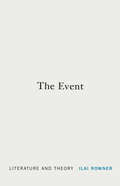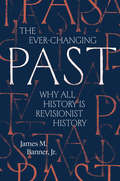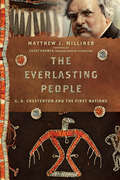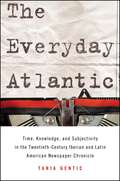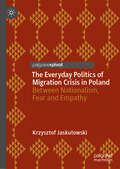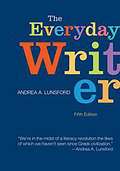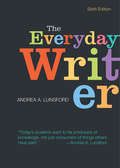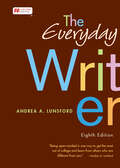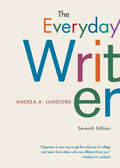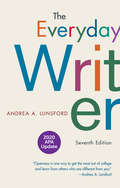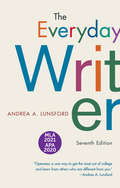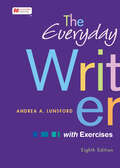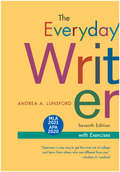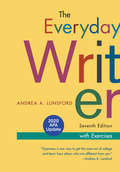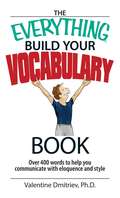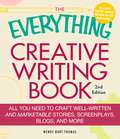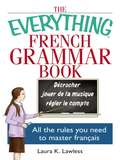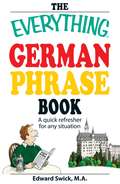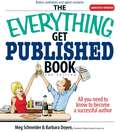- Table View
- List View
The Event: Literature and Theory
by Ilai RownerWhat is an event? From a philosophical perspective, events are irregular occurrences—moments of change and interruption—categorized by human perception, language, and thought. While philosophers have pored over the subject of events extensively in recent years, The Event: Literature and Theory seeks to ground it: What is literature’s approach to the event? How does literature produce and give testimony to events? Ilai Rowner’s study not only revisits some of the most important thinkers of our time, including Maurice Blanchot, Gilles Deleuze, Jacques Derrida, and Martin Heidegger, it also develops a critical approach to literature that questions the meaning of the literary event through examinations of literary works by Marcel Proust, Louis-Ferdinand Céline, and T. S. Eliot. Rowner offers a new method of thinking about the particular characteristics of the event within literary works and defines the creative value of literature as the aspiration toward the un-happening within the happening. In this study the experience of literature—as an act of both writing and reading—becomes the struggle to capture the excessive movement of the event while also revealing the creative energy within that work of literature.
The Ever-Changing Past: Why All History Is Revisionist History
by James M. Banner Jr.An experienced, multi-faceted historian shows how revisionist history is at the heart of creating historical knowledge"A rallying cry in favor of historians who, revisiting past subjects, change their minds. . . . Rewarding reading."—Kirkus Reviews History is not, and has never been, inert, certain, merely factual, and beyond reinterpretation. Taking readers from Thucydides to the origin of the French Revolution to the Civil War and beyond, James M. Banner, Jr. explores what historians do and why they do it. Banner shows why historical knowledge is unlikely ever to be unchanging, why history as a branch of knowledge is always a search for meaning and a constant source of argument, and why history is so essential to individuals&’ awareness of their location in the world and to every group and nation&’s sense of identity and destiny. He explains why all historians are revisionists while they seek to more fully understand the past, and how they always bring their distinct minds, dispositions, perspectives, and purposes to bear on the subjects they study.
The Everlasting People: G. K. Chesterton and the First Nations (Hansen Lectureship Series)
by Matthew J. MillinerFirst Things Book of the Year award What does the cross of Christ have to do with the thunderbird? How might the life and work of Christian writer G. K. Chesterton shed light on our understanding of North American Indigenous art and history? This unexpected connection forms the basis of these discerning reflections by art historian Matthew Milliner. In this fifth volume in the Hansen Lectureship Series, Milliner appeals to Chesterton's life and work—including The Everlasting Man, his neglected poetry, his love for his native England, and his own visits to America—in order to understand and appreciate both Indigenous art and the complex, often tragic history of First Nations peoples, especially in the American Midwest. The Hansen Lectureship series offers accessible and insightful reflections by Wheaton College faculty on the transformative work of the Wade Center authors.
The Everyday Atlantic: Time, Knowledge, and Subjectivity in the Twentieth-Century Iberian and Latin American Newspaper Chronicle (SUNY series in Latin American and Iberian Thought and Culture)
by Tania GenticIn The Everyday Atlantic, Tania Gentic offers a new understanding of the ways in which individuals and communities perceive themselves in the twentieth-century Atlantic world. She grounds her study in first-time comparative readings of daily newspaper texts, written in Spanish, Portuguese, and Catalan. Known as chronicles, these everyday literary writings are a precursor to the blog and reveal the ephemerality of identity as it is represented and received daily. Throughout the text Gentic offers fresh readings of well-known and lesser-known chroniclers (cronistas), including Eugeni d'Ors (Catalonia), Germán Arciniegas (Colombia), Clarice Lispector (Brazil), Carlos Monsiváis (Mexico), and Brazilian blogger Ricardo Noblat.While previous approaches to the Atlantic have focused on geographical crossings by subjects, Gentic highlights the everyday moments of reading and thought in which discourses of nation, postcolonialism, and globalization come into conflict. Critics have often evaluated in isolation how ideology, ethics, affect, and the body inform identity; however, Gentic skillfully combines these approaches to demonstrate how the chronicle exposes everyday representations of self and community.
The Everyday Politics of Migration Crisis in Poland: Between Nationalism, Fear and Empathy
by Krzysztof JaskulowskiThis book explores attitudes towards migrants and refugees from North Africa and the Middle East during the so-called migration crisis in 2015-2016 in Poland. Beginning with an examination of Polish government policy and the discursive construction of refugees in the media, politics and popular culture, it argues that they identified refugees with Muslims, who were deemed to pose a threat to the Polish nation. This analysis establishes the Islamophobic public discourse which is shown to be variously reproduced, negotiated and contested in the nuanced study of Polish attitudes which follows. Drawing on original qualitative research and constructivist theory, the book examines differing stances towards refugees in the context of the lay understanding of the Polish nation and its boundaries. In doing so it demonstrates the influence of discourses that draw on an exclusionary concept of national identity and the potential for them to be mobilised against immigrants. This timely, theory-based case study will provide a valuable resource for students and scholars of Central and Eastern European politics, nationalism, race, migration and refugee studies.
The Everyday Writer
by Andrea A. LunsfordAndrea Lunsfords research shows that students are writing more than ever -- in classrooms, workplaces, and social spaces, in local communities and around the world. "The Everyday Writer," Fifth Edition, is the first tabbed handbook to help the participants in this "literacy revolution" build on the smart decisions they make as social writers -- and use their skills in their academic and professional work. With Andrea Lunsfords trademark attention to rhetorical choice and language, and with new chapters on public writing, critical reading, and understanding how and why to use documentation, "The Everyday Writer" gives today's students the information they need to be effective, ethical writers. New illustrations by graphic artist G. B. Tran make complicated concepts clear and inviting for students.
The Everyday Writer
by Andrea A. Lunsford Christine M. Tardy Paul Kei MatsudaContexts for writing keep changing, and Andrea Lunsford knows that every writer needs to engage with audiences and communicate ideas every day. The Everyday Writer shows novice writers how to navigate rhetorical situations and make effective choices everywhere they write. The illustrations, by Eisner Award nominee GB Tran, offer a high-interest approach to writing processes and encourage students to open and use their handbook. And Andrea’s friendly voice is always front and center, ready to answer any question. With new and expanded coverage of presentations and multimodal projects, integrated advice for writers from all language and educational backgrounds, and help learning the moves that make expert writers credible, The Everyday Writer is the encouraging guide students need to take their writing to the next level.
The Everyday Writer
by Andrea LunsfordThe Everyday Writer equips you to make informed writing choices for your courses, your career, and your community while also providing all of the writing resources you need in an engaging and highly-visual handbook.
The Everyday Writer
by Andrea LunsfordEmpowering and inspiring, Andrea Lunsford offers a handbook for our times. The Everyday Writer, Seventh Edition, invites students to think rhetorically, communicate ethically, listen respectfully, experiment with language, and adopt openness as a habit of mind necessary for democracy. The seventh edition introduces new chapters on college expectations and on language and identity as well as substantial new advice for reading and interrogating sources, seeking common ground with opponents, using varieties of English, and being open to new approaches in common academic genres. New student models of rhetorical analysis, researched argument, speech, and translingual narrative invigorate the book. As always, Lunsford’s Top Twenty--now its own tabbed section--serves as a guide for building students’ confidence as editors of their own writing.
The Everyday Writer with 2020 APA Update: with a 2020 APA Update
by Andrea LunsfordEmpowering and inspiring, Andrea Lunsford offers a handbook for our times. The Everyday Writer, Seventh Edition, invites students to think rhetorically, communicate ethically, listen respectfully, experiment with language, and adopt openness as a habit of mind necessary for democracy. The seventh edition introduces new chapters on college expectations and on language and identity as well as substantial new advice for reading and interrogating sources, seeking common ground with opponents, using varieties of English, and being open to new approaches in common academic genres. New student models of rhetorical analysis, researched argument, speech, and translingual narrative invigorate the book. As always, Lunsford’s Top Twenty--now its own tabbed section--serves as a guide for building students’ confidence as editors of their own writing.
The Everyday Writer with 2020 APA and 2021 MLA Updates
by Andrea A. LunsfordThis ebook has been updated to provide you with the latest guidance on documenting sources in MLA style and follows the guidelines set forth in the MLA Handbook, 9th edition (April 2021).
The Everyday Writer with Exercises
by Andrea LunsfordThe Everyday Writer with Exercises equips you to make informed writing choices for your courses, your career, and your community while also providing all of the writing resources you need in an engaging and highly-visual handbook.
The Everyday Writer with Exercises with 2020 APA and 2021 MLA Updates
by Andrea A. LunsfordThis ebook has been updated to provide you with the latest guidance on documenting sources in MLA style and follows the guidelines set forth in the MLA Handbook, 9th edition (April 2021).The Everyday Writer with Exercises, Seventh Edition, invites you to think through the choices you have in any writing situation--in other words, it invites you to think rhetorically. A book for our times, it will also help you communicate ethically, listen respectfully, experiment with language, and adopt openness as a habit of mind. Plenty of student models help you with different kinds of writing, and Lunsford’s Top Twenty serves as a guide for building your confidence as editor of your own work. A easy-to-use practical guide to the power of writers’ language and the power of writers’ choices, The Everyday Writer with Exercises is your tool for making something happen in the classroom--and in the world.
The Everyday Writer with Exercises, 2020 APA Update
by Andrea LunsfordEmpowering and inspiring, Andrea Lunsford offers a handbook for our times. The Everyday Writer with Exercises, Seventh Edition, invites students to think rhetorically, communicate ethically, listen respectfully, experiment with language, and adopt openness as a habit of mind necessary for democracy. The seventh edition introduces new chapters on college expectations and on language and identity as well as substantial new advice for reading and interrogating sources, seeking common ground with opponents, using varieties of English, and being open to new approaches in common academic genres. New student models of rhetorical analysis, researched argument, speech, and translingual narrative invigorate the book. As always, Lunsford’s Top Twenty--now its own tabbed section--serves as a guide for building students’ confidence as editors of their own writing.
The Everything Bible Word Search Book
by Charles TimmermanWord search fans will be able to test their Bible knowledge with this word search collection. Packed with 150 puzzles, this entertaining book mixes Bible passages with the most popular Everything® puzzle, including: Forbidden Fruit; Samson and Delilah; The Proverbs of Solomon; The Road to Damascus; The Good Shepherd; and more. This book is perfect for Bible students looking for a fun way to review the New and Old Testaments or for word search lovers who enjoy challenging themselves with theme puzzles.
The Everything Build Your Vocabulary Book
by Valentine DmitrievWith exercises, puzzles, and games, The Everything Build Your Vocabulary Book helps you to improve your vocabulary and enhance your communication skills. This fun, interactive book includes: Words you need every day Commonly misused words and phrases Medical, scientific, business, and legal terms Interchangeable words Words to use in place of idioms, clichés, and slang. This easy-to-follow book painlessly teaches you the words you need to know to sound composed and professional-today!
The Everything Build Your Vocabulary Book: Over 400 Words to Help You Communicate With Eloquence And Style
by Valentine DmitrievA Simon & Schuster eBook. Simon & Schuster has a great book for every reader.
The Everything Creative Writing Book
by Wendy Burt-ThomasMany people can write. But writing well enough to get published takes hours of practice, the ability to take criticism, and expert advice. Filled with stories and tips from published authors, this easy-to-use guide teaches you the basics of the writing craft. Whether you want to create poems or plays, children's books or online blogs, romance novels or a memoir, you'll learn to write more effectively and creatively. Published author, editor, and PR consultant Wendy Burt-Thomas covers all aspects of writing, including how to:Prepare to write, from planning to research to organizationProperly structure your piece to fit your chosen genre Stay focused during the drafting and editing processesWork with other authorsOvercome writer's blockMarket your writingWhether you're an aspiring or experienced writer, you'll find all you need to spark creativity and get your works in print. With exercises, techniques, samples, and interviews with published writers, The Everything Creative Writing Book, 2nd Edition will turn any dedicated craftsman into a great writer.
The Everything Creative Writing Book, 2nd Edition
by Wendy Burt-ThomasAll you need to craft well-written and marketable stories, screenplays, blogs, and more
The Everything Creative Writing Book: All you need to know to write novels, plays, short stories, screenplays, poems, articles, or blogs
by Wendy Burt-ThomasMany people can write. But writing well enough to get published takes hours of practice, the ability to take criticism, and expert advice. Filled with stories and tips from published authors, this easy-to-use guide teaches you the basics of the writing craft. Whether you want to create poems or plays, children's books or online blogs, romance novels or a memoir, you'll learn to write more effectively and creatively. Published author, editor, and PR consultant Wendy Burt-Thomas covers all aspects of writing, including how to:Prepare to write, from planning to research to organizationProperly structure your piece to fit your chosen genre Stay focused during the drafting and editing processesWork with other authorsOvercome writer's blockMarket your writing
The Everything Filmmaking Book: From Script to Premiere -a Complete Guide to Putting Your Vision on the Screen (Everything® Series)
by Barb Karg Rick Sutherland Jim Van OverFilmmaking is a notoriously difficult field to break into—a script&’s chance of making it to production is a staggering 1 in every 140,000. But the millions of aspiring filmmakers can up their odds with The Everything Filmmaking Book. This engaging, easy-to-follow guide takes readers step-by-step through the filmmaking process, including: -Writing a marketable script -Understanding all aspects of pre-production -Shooting on location -Working with the cast -Editing and post-production -Distributing the finished film The Everything Filmmaking Book is the perfect guide for future Spielbergs everywhere!
The Everything French Grammar Book
by Laura K LawlessThe Everything French Grammar Book provides readers with easy-to-follow lessons on the rules, syntax, and sentence structure of the French language. From punctuation to pronouns, this handy reference walks readers through the basics of proper French speaking. Step-by-step instruction, fun reinforcement exercises, and clever mnemonic clues help readers master conjugation, tense use, and sentence structure quickly! Complete with verb charts, The Everything French Grammar Book is the perfect reference for the Gallic enthusiast.
The Everything German Phrase Book: A quick refresher for any situation (Everything® Series)
by Edward SwickTravelers need more than danke schön to get around Germany. Featuring hundreds of commonly used phrases, this pocket-sized guide provides travellers with the words they need in any setting. They will be able to order dinner, talk on the phone, read street signs and train schedules, and shop with confidence. This book even features the basics of German grammar and pronunciation as well as common idioms and slang words. Conveniently organized and indexed by category, this quick reference guide is all travellers need to make the most of their trips.
The Everything Get Published Book
by Meg Schneider Barbara Doyen- First edition has sold over 50,000 copies! - Includes an updated agent and publisher listing With even more tips and tricks to getting published than the last edition, The Everything Get Published Book, 2nd Edition is the insider's publishing course--in a book! From getting started to printed pages, readers get step-by-step help, including: - Guidance on planning a writing career and building a platform - No-nonsense advice on finding a market - An insider's view of the different publishing markets - Contract negotiation tips from the pros - Surefire ways to get a submission taken seriously Completely revised and updated by the author/agent team who coauthored The Everything Guide to Writing a Book Proposal, this revision has everything today's hopeful writers need to turn pro!
The Everything Get Published Book
by Meg Schneider Barbara DoyenWith even more tips and tricks to getting published than the last edition, The Everything Get Published Book, 2nd Edition is the insider's publishing course--in a book! From getting started to printed pages including: guidance on planning a writing career and building a platform; no-nonsense advice on finding a market; an insider's view of the different publishing markets; contract negotiation tips from the pros; surefire ways to get a submission taken seriously; and much more. Completely revised and updated by the author/agent team who coauthored The Everything Guide to Writing a Book Proposal, this revision has everything today's hopeful writers need to turn pro!
